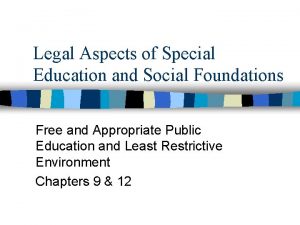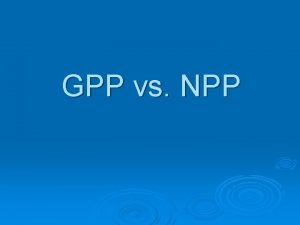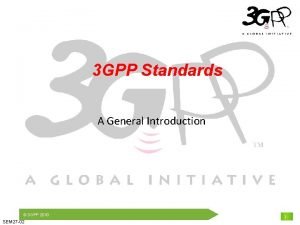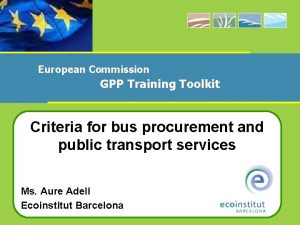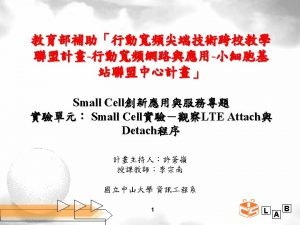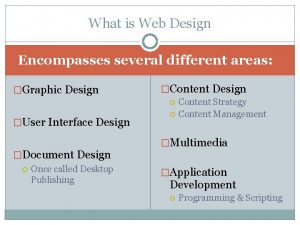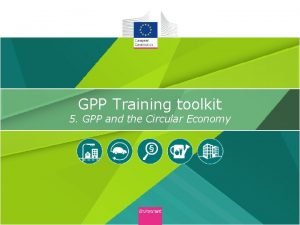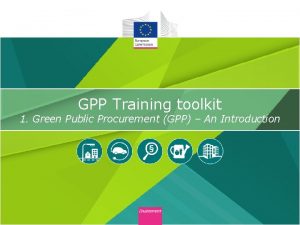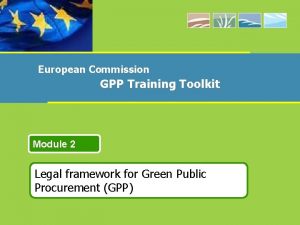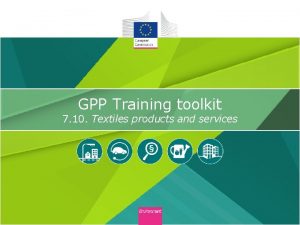GPP Training toolkit 3 Legal Aspects of GPP








































- Slides: 40

GPP Training toolkit 3. Legal Aspects of GPP

GPP Training Toolkit Module 1: Introduction Module 4: Needs Assessment Module 2: Strategic Aspects of GPP Module 5: Circular Procurement Module 3: Legal Aspects of GPP Module 6: Market Engagement Module 7: Operational (Key sectors for GPP) Module 3: Legal Aspects of GPP 2

Content of Module 3 1. Relevant sources of law 2. EU Treaty Principles 3. 2014 Procurement Directives 4. The Link to the Subject-matter 5. Choice of procedures 6. Exclusion + selection of bidders 7. Technical specifications 8. Award criteria 9. Combining specifications and award criteria 10. Contract performance clauses 11. Summary and further guidance Module 3: Legal aspects of GPP 3

Relevant sources of law • Treaty on the Functioning of the EU (TFEU) • EU Procurement Directives: 2014/23/EU, 2014/24/EU and 2014/25/EU • EU Remedies Directives 89/665/EEC and 92/13/EEC as amended by 2007/66/EC and 2014/23/EU • EU sectoral legislation e. g. Clean Vehicles Directive, Energy Efficiency Directive • National implementing legislation • Case law of Court of Justice of EU + national courts • WTO Government Procurement Agreement Module 3: Legal aspects of GPP 4

EU Treaty principles – Equal treatment Equal Treatment • Includes requirement of non-discrimination based on nationality • Applies to all procurement covered by directives or of certain cross-border interest • Does NOT mean treating everyone the same – but treating them according to objective criteria Definition of Equal Treatment “comparable situations must not be treated differently and different situations must not be treated in the same way, unless such treatment is objectively justified. " - Joined Cases C-21/03 and C-34/03 Fabricom Module 3: Legal aspects of GPP 5

EU Treaty principles Transparency • Developed to ensure compliance with principles of nondiscrimination/equal treatment • Contracts must be advertised at the appropriate level depending on their value • Tender documents and all criteria applied must be clear to the ‘reasonably well-informed and normally diligent’ tenderer (Case C-19/00 SIAC) • Any changes to procedure must be notified to all bidders, and deadlines may need to be extended • Must notify bidders of reasons for rejection of bid Module 3: Legal aspects of GPP 6

EU Treaty principles Proportionality Procurement criteria and decisions must: i. be appropriate to achieve the objectives they pursue; and ii. not go beyond what is needed to attain those objectives. Proportionality is relevant when deciding which GPP criteria to apply and how to evaluate the evidence that bidders provide. Module 3: Legal aspects of GPP 7

EU Treaty principles Mutual recognition • Evidence of professional qualifications, labels and certificates from other member states must be taken into consideration • Important for GPP due to the need to take equivalents into account when evaluating compliance with criteria Mutual recognition explained “the principle of mutual recognition makes it possible for the free movement of goods and services to be ensured without there being any need to harmonise the national legislation of the Member States" - Case C-120/78 Rewe-Zentral Module 3: Legal aspects of GPP 8

2014 Procurement Directives These introduced important new provisions for GPP: • Ability to specify production processes and methods • Extension of environmental management systems • Greater ability to rely on eco-labels • New rules on life-cycle costing • Ability to reject tenders which do not comply with environmental and social obligations • Ability to reject subcontractors who do not comply with environmental and social obligations Module 3: Legal aspects of GPP 9

2014 Directives Exclusion + Selection • The directives define common exclusion grounds for bidders. These relate to serious offences or problems in past performance – some of which are relevant to GPP • Selection criteria can also be used to identify which companies have appropriate technical and professional ability to carry out a contract (including previous experience) • Exclusion and selection must be proportionate and based on pre-defined criteria Module 3: Legal aspects of GPP 10

2014 Directives Technical Specifications • Technical specifications are the minimum requirements which all tenders must meet, for example “All products must contain at least 65% recycled material” • Tenders which do not comply with technical specifications must be rejected • There are various ways to formulate technical specifications, including performance-based or functional specifications (see Module 4) • Specifications may relate to any lifecycle stage, e. g. production methods Module 3: Legal aspects of GPP 11

2014 Directives Award Criteria • Under the directives, all contracts must be awarded on the basis of “most economically advantageous tender” (MEAT) • This allows a combination of cost (including life-cycle cost) and qualitative criteria to be set by the contracting authority • Environmental characteristics can be evaluated, provided these are linked to the subject-matter • Life-cycle costing can be used to calculate the true cost of ownership, including environmental costs Module 3: Legal aspects of GPP 12

2014 Directives Contract performance clauses may include GPP elements – for example: • To regulate how goods are packaged and delivered • In a service contract (e. g. cleaning, catering) how waste and recycling are managed • In a works contract, responsibility of the main contractor and subcontractors for environmental protection Contract performance clauses must be linked to the subject-matter and advertised in advance. Module 3: Legal aspects of GPP 13

The Link to the Subject-matter (Lt. SM) • Selection criteria, technical specifications, award criteria and contract clauses must all be linked to the subjectmatter of the contract • Important for GPP as this limits the ability to look at the overall practices of a bidding company Definition of Lt. SM “[criteria which]relate to the works, supplies or services to be provided under that contract in any respect and at any stage of their life cycle, including factors involved in: (a) the specific process of production, provision or trading of those works, supplies or services; or (b) a specific process for another stage of their life cycle, even where such factors do not form part of their material substance. ” (Art. 67) Module 3: Legal aspects of GPP 14

Defining the subject-matter of the contract • Contracting authorities are free to define the subject matter of each contract, and can do so in a way which explicitly includes environmental objectives • The definition will affect the scope of GPP criteria which you can apply • Choice between service or supply contract may also be important Module 3: Legal aspects of GPP 15

Examples of criteria which are/are not Lt. SM ü In a contract for supply of uniforms, a requirement that the uniforms be made from organic cotton ü In a contract for cleaning services, extra marks available for the use of eco-labelled products ü A requirement that a company have in place supply chain management measures which address specific environmental concerns (e. g. safe handling of chemicals) Х In a contract for supply of uniforms, a requirement that suppliers only use organic cotton in all of their products Х In a cleaning services contract, extra marks for companies which use eco-labelled products in all of their contracts Х A requirement that a company engage in ‘sustainable purchasing’ (without further definition) Module 3: Legal aspects of GPP 16

Choice of procedures Five procedures are available under the directives: Open Procedure – bids can be submitted by any operator Restricted Procedure – at least five bidders are selected based on objective criteria Competitive Procedure with Negotiation – at least three bidders are selected based on objective criteria; bids can be negotiated Competitive Dialogue – at least three participants are chosen to develop solutions based on a description of the authority’s requirements Innovation Partnership – at least three partners are chosen to develop goods or services which do not yet exist on the market, using a phased contract structure. Module 3: Legal aspects of GPP 17

Impact of procedure on GPP • Choice of procedure is important because it determines who will be able to compete for your contract and how you apply certain criteria • If previous experience or other aspects of technical capacity are particularly important for a contract, the open procedure may not be the most appropriate • Keep in mind that GPP may add to the complexity of a tender, so it is vital to allow sufficient time for bidders to respond Module 3: Legal aspects of GPP 18

Benefits of flexible procedures • Competitive procedure with negotiation, competitive dialogue and innovation partnership offer more flexibility than open/restricted procedures • This flexibility can be useful for GPP, especially if it is difficult to write a detailed technical specification due to lack of market knowledge • Another way to address this problem is to engage in market engagement (see Module 6) Module 3: Legal aspects of GPP 19

Grounds for exclusion The 2014 directives prescribe certain mandatory and discretionary grounds for excluding bidders. The most relevant for the purposes of GPP are: • Non-compliance with applicable national, EU or international environmental laws • Grave professional misconduct which renders integrity questionable • Significant/persistent deficiencies in performance under a prior contract • Misrepresentation of any of the above or inability to submit supporting documents Module 3: Legal aspects of GPP 20

Selecting bidders The following considerations can be taken into account at selection stage, and are relevant for GPP: • Human and technical resources • Experience and references • Educational and professional qualifications of staff • Environmental management systems and schemes (e. g. EMAS, ISO 14001) • Supply chain management/tracking systems • Samples of products • Conformity assessment certificates Module 3: Legal aspects of GPP 21

Environmental management systems • Provide a structured and third-party certified way to manage environmental performance • EMAS and EN/ISO 14 001 are the most common systems in use in Europe • At selection stage, can request evidence of the environmental management measures which the operator will be able to apply for the contract • Other forms of evidence (such as an in-house system) must be considered where an operator has no access to third-party certification or no possibility to obtain it within the relevant time limits for reasons which are not attributable to it Module 3: Legal aspects of GPP 22

Technical specifications Under the directives there is a choice between: Performance-based or functional specification • Describe characteristics required of the goods, services or works, including environmental characteristics and production processes or methods Specification based on standards • Refer to European, international or national standards/ technical assessments – these must be accompanied by the words ‘or equivalent’ OR a combination of these two approaches Module 3: Legal aspects of GPP 23

Minimum requirements and variants • Technical specifications prescribe minimum requirements. This means that if a tender does not conform to the specifications, it must be rejected. • In some cases, contracting authorities wish to provide more flexibility while still ensuring they receive bids which meet their requirements. • Variants can be used to allow bids which do not conform fully to the technical specifications to be considered, either instead of or in addition to fully compliant bids. Module 3: Legal aspects of GPP 24

Using labels in technical specifications • Third party environmental labels can be referred to in specifications, award criteria, contract terms • Labels can reduce the amount of work involved in defining and verifying environmental aspects of tenders • In order to refer directly to a label, it must meet certain transparency and accessibility requirements Module 3: Legal aspects of GPP 25

Requirements for using labels in tenders i. they only concern criteria which are linked to the subject matter of the contract; ii. they are based on objectively verifiable and nondiscriminatory criteria; iii. they are established using an open and transparent procedure in which all relevant stakeholders, incl. government bodies, consumers, social partners, manufacturers, distributors and non-governmental organisations, may participate; iv. they are accessible to all interested parties; v. they are set by a third party over which the economic operator applying for the label cannot exercise a decisive influence Module 3: Legal aspects of GPP 26

Examples of label criteria which can/can’t be included in tenders ü A requirement for products to be tested for energy or water consumption, and to meet minimum efficiency standards ü A requirement for the company to provide samples or technical information sheets for the product to be labelled ü Requirements which are published on the website of the label provider Х A requirement for products to be tested at one particular facility or in one region/country Х A requirement for the company to provide samples or information on all of its products or services Х Requirements which are set by the company using the label itself, or which are not available to other operators Module 3: Legal aspects of GPP 27

Award criteria • Determine the winning bid from amongst those which meet the technical specifications • Combine cost (including life-cycle cost) and qualitative criteria to determine MEAT • Can include a range of environmental factors Award Criteria must… • be linked to the subject-matter of the contract; • not confer an unrestricted freedom of choice on the contracting authority; • ensure the possibility of effective competition; • be expressly mentioned in the contract notice and tender documents, together with their weightings and any applicable sub-criteria; and • comply with the Treaty principles. Module 3: Legal aspects of GPP 28

Choosing environmental award criteria The EU GPP criteria contain a range of suggested award criteria for each product/service group, e. g. : Office Buildings: “Points will be awarded in proportion to the additional primary energy demand of the building to be supplied/generated by localised renewable energy sources or high efficiency alternative systems. ” Textiles: “Points will be awarded in proportion to each 10 % improvement upon the minimum technical specification of certified IPM or organic cotton content” EU GPP criteria website Module 3: Legal aspects of GPP 29

Weighting and scoring award criteria • There is no minimum or maximum number of points which can be assigned to environmental award criteria • In Case C-448/01 EVN Wienstrom, the CJEU approved in principle an award criterion related to renewable energy weighted at 45% • Consider the impact which different weightings and scoring methods will have on the evaluation, and if they provide bidders with an incentive to compete on environmental factors Module 3: Legal aspects of GPP 30

Life-cycle costing (LCC) • LCC allows comparison of the true costs of tenders • Covers costs borne by contracting authority or other users, e. g. acquisition, use, maintenance and end-of-life • Also environmental externalities, provided their monetary value can be determined and verified, e. g. greenhouse gas emissions Module 3: Legal aspects of GPP 31

LCC requirements Must indicate method to be applied and data required from tenderers in the procurement documents. Method must be: • Based on objectively verifiable & non-discriminatory criteria; • Accessible to all interested parties; • Data required can be provided with reasonable effort by normally diligent economic operators, including operators from third countries. Where a common EU methodology has been developed, must apply this (currently only applies under Clean Vehicles Directive) Module 3: Legal aspects of GPP 32

Abnormally low tenders • In some cases, a tender with a very low price may not respect environmental obligations (e. g. to dispose of waste properly) • Such tenders must be investigated to determine the reason for the low price and confirm whether they meet all legal requirements • Bidders must be given an opportunity to explain their pricing Module 3: Legal aspects of GPP 33

Specifications vs award criteria In GPP, specifications and award criteria are often combined to target environmental performance. It is important to distinguish between their roles: Technical Specifications • Can be functional or based on standards • Cannot be waived unless variants permitted • Best for ensuring that all bids will meet minimum environmental standards Award Criteria • Can address wide range of environmental factors • Assign marks for better performance • Best for stimulating the market to provide more sustainable solutions Module 3: Legal aspects of GPP 34

Contract performance clauses for GPP • To ensure that GPP commitments are respected in the delivery of contracts, it is vital to include robust contract performance terms • These must be linked to the subject-matter of the contract & advertised in advance in the notice or tender documents • Bidders may be asked to confirm their acceptance of the terms during the tender procedure Module 3: Legal aspects of GPP 35

Setting contract performance clauses GPP contract clauses should be specific to the requirements of the tender, not “one size fits all” Examples: Supply contract – type of packaging and duty on the supplier to recycle/reuse it; frequency of deliveries; type of vehicle used for delivery Service contract – staff training in environmental aspects of contract; monitoring and reporting environmental impacts; applying an EMS Works contract – management of waste, energy and water on construction site; third-party certification for buildings or civil engineering works Module 3: Legal aspects of GPP 36

Enforcing contract performance clauses • GPP contract clauses should always include the following: What needs to be done Who needs to do it How it will be monitored • Third party audits/monitoring/certification may be appropriate in some cases • Incentives and/or penalties may be included to further motivate GPP performance Module 3: Legal aspects of GPP 37

Summary of Module 3 • GPP is governed by the EU procurement directives, Treaty principles, case law and national legislation • Equal treatment, transparency, proportionality and mutual recognition must be applied • The 2014 procurement directives allow GPP to be applied throughout the tender process • The link to the subject-matter requirement sets a limit to what bidders can be asked for • GPP can be applied in each of the five procedures Module 3: Legal aspects of GPP 38

Summary of Module 3 continued • Exclusion and selection of bidders may include environmental aspects • Technical specifications can set minimum environmental requirements, including by reference to third-party labels • Award criteria are used to evaluate performance above and beyond the minimum requirements, and may include life-cycle costing • Contract performance clauses should enforce GPP commitments, and be specific to each contract Module 3: Legal aspects of GPP 39

Further guidance Buying Green (3 rd edition, 2016) EU GPP criteria Good Practice Examples GPP Helpdesk For further support on GPP, contact the EU’s free Helpdesk Circular Procurement Guidance (2017) Toolkit developed for the European Commission by ICLEI - Local Governments for Sustainability Module Author: Public Procurement Analysis Owner, Editor: European Commission, DG Environment, 2019 Photos: courtesy of Pixabay. com under Creative Commons CCO Disclaimer: This toolkit is an indicative document of the Commission services and cannot be considered binding to this institution in any way. Neither the European Commission nor any person acting on behalf of the Commission is responsible for the use that might be made of the information in this document. Module 3: Legal aspects of GPP
 Legal aspects of catering premises
Legal aspects of catering premises Legal aspects of software engineering
Legal aspects of software engineering Legal aspects of doing business in canada
Legal aspects of doing business in canada Chapter 3 legal and ethical aspects of nursing
Chapter 3 legal and ethical aspects of nursing Professional issues in cyber security
Professional issues in cyber security Legal aspects of special education
Legal aspects of special education Legal aspects of advertising
Legal aspects of advertising Manajemen pembangunan proyek
Manajemen pembangunan proyek Ethical and legal issues in community health nursing
Ethical and legal issues in community health nursing Scbon
Scbon Legal issues in nursing documentation
Legal issues in nursing documentation Legal aspects definition
Legal aspects definition Qms school training toolkit
Qms school training toolkit Pad exercise training toolkit
Pad exercise training toolkit Npp vs gpp
Npp vs gpp Gpp in pharmacy
Gpp in pharmacy Gpp
Gpp Revo pico wifi internet radio
Revo pico wifi internet radio Gpp bus
Gpp bus Gpp lte means
Gpp lte means Gpp lte meaning
Gpp lte meaning Gpp lte meaning
Gpp lte meaning Maksud outstanding gpp
Maksud outstanding gpp Apple gpp
Apple gpp Gpp lte
Gpp lte Gpp standards
Gpp standards E:mbb.22
E:mbb.22 Cara membuat gaji induk di aplikasi gpp 2020
Cara membuat gaji induk di aplikasi gpp 2020 Dontologue
Dontologue It encompasses several different aspects including
It encompasses several different aspects including 6 aspects of wellness
6 aspects of wellness Chapter 18 visual merchandising and display
Chapter 18 visual merchandising and display Trade related aspects of intellectual property rights
Trade related aspects of intellectual property rights Palmer hayden jeunesse
Palmer hayden jeunesse 5 themes of geography rap
5 themes of geography rap What is all aspects of software production
What is all aspects of software production Cyclical theory of social change
Cyclical theory of social change Consciuosly
Consciuosly Cultural aspects
Cultural aspects Examples of ego defense mechanisms
Examples of ego defense mechanisms Abstraction-occurrence design pattern
Abstraction-occurrence design pattern





